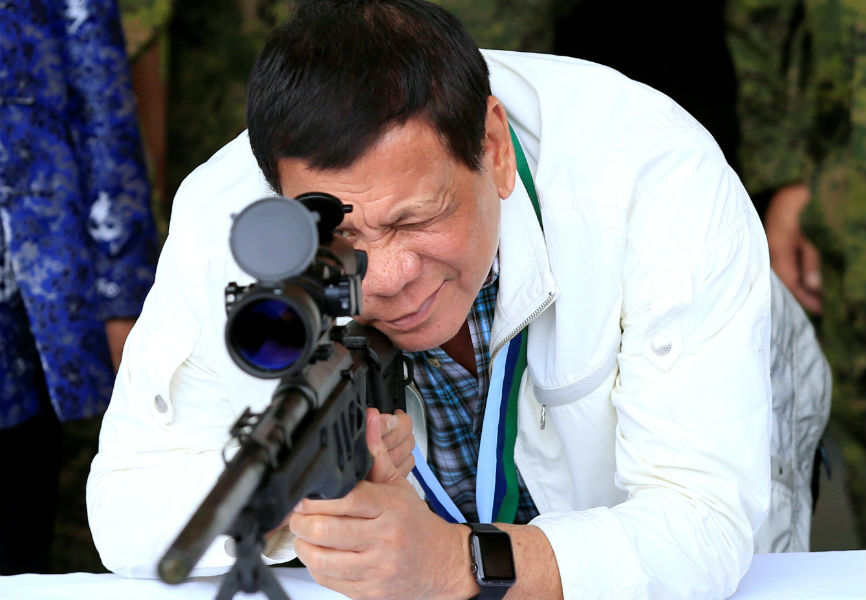Philippines President Rodrigo Duterte has generated headlines around the world for his profane language, violent drug crackdown, and antipathy toward the US. Yet, as results from Monday's midterm election show, the 74-year-old leader remains popular at home. Eurasia Group expert
Peter Mumford explains the keys of Duterte's success.
What do the election results mean for Duterte's policies?
Nearly complete vote counts suggest Duterte allies won all 12 of the Senate seats up for grabs in the midterm, giving him a three-quarters supermajority in that chamber. The results will give him the political capital to push forward with economic policies such as an overhaul of the tax code and a loosening of restrictions on foreign direct investment. They could even be enough to allow him to pursue his plans to reform the constitution, which would include facilitating a move to a more federal political structure and ensuring that the president and vice president are elected on joint tickets in the future. However, even some pro-Duterte senators are opposed to these changes, which would require a three-quarters supermajority in both the House of Representatives and the Senate.
More broadly, Duterte will view the results as a validation of his hardline approach to governance and issues such as drugs and crime. Often referred to as a “strongman” leader,
Duterte has been likened to Russian President Vladimir Putin and Turkish President Recep Tayyip Erdogan, and he has been accused of taking steps to undermine the independence of the media, courts, and other institutions.
What accounts for Duterte's enduring popularity despite the controversies surrounding him?
Duterte, in addition, is prone to profane and off-color outbursts. While these episodes make many Filipinos uncomfortable, most tend to view them as amusing and/or dismiss them as meaningless comments that should not be taken seriously. For these people, Duterte's outbursts are a sign that he is different to the standard politician and a more authentic person.
Duterte also satisfies the desire of a significant segment of the population for strong political leadership. Moreover, many of his government's policies are aimed at improving standards of living in the impoverished nation. These measures include a tax reform that shifts some of the burden off the poor and on to the wealthy, steps to remedy the country's deficient infrastructure, and a program of free college education.
There has been a lot of international criticism for Duterte's so-called war on drugs. How is it viewed domestically?
Many governments and rights advocates around the world have protested against a crackdown on drug crime that the has killed more than 12,000 Filipinos,
according to Human Rights Watch. But domestically it enjoys relatively strong support, which has endured longer than many observers anticipated. Communities that have been devastated by drugs and related crimes over recent decades are pleased to see a government taking tough action to address the longstanding problem, and official crime rates have dropped since Duterte took office. For many people in the Philippines, the seemingly positive outcomes justify the president's approach.
This support has flagged in the past when evidence of extra-judicial killings by the police or security forces has become publicly available. However, the negative reaction is usually short-lived and addressed by Duterte promising to rein in his security forces. There remains a risk that as more people are killed in the war and more families lose relatives, support for the president's hard line will decline. But many observers thought this would have happened by now.
How has Duterte's friendly stance toward China and his unfriendly stance toward the US played domestically?
Duterte's attitudes toward the two superpowers competing for influence in the region are at odds with historical norms in the Philippines, but he has been able to keep his views from becoming a political liability. Duterte has wooed the nation's pro-US military by increasing soldiers' salaries, appointing several ex-armed forces chiefs to his cabinet, and allowing the military to maintain strong ties with its US counterparts despite Duterte's touchier relationship with Washington (which has improved slightly under President Donald Trump).
Similarly, most of the public compartmentalize their support for the president on most issues and disapprove of
his pivot toward Beijing. Nevertheless, this policy has created risks for Duterte, and he is under pressure to deliver results in terms of increased investment and infrastructure projects from his closeness with Beijing. These risks will increase if he backs too far away from defending Philippine sovereignty claims in the South China Sea—for example, if he fails to secure a significant share of revenue from proposed joint oil exploration in the area with China.

 Philippines President Rodrigo Duterte. REUTERS.
Philippines President Rodrigo Duterte. REUTERS.
